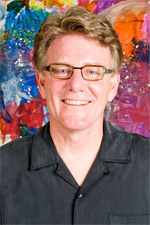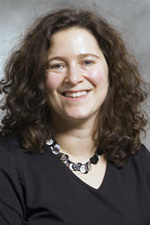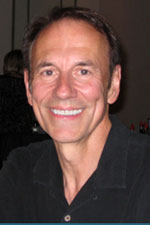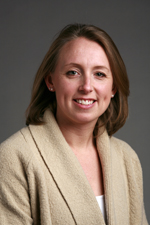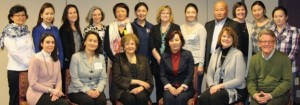The 2013 Light a Candle Award recipient is Lynn Haglin, who was presented the award at the Center for Early Education and Development’s 40th anniversary celebration on Nov. 7 at the McNamara Alumni Center.
The Light a Candle award was created by CEED in honor of Mary 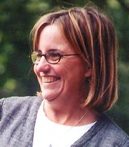 McEvoy (right), Ph.D., a tireless researcher, advocate, and collaborator. A highly respected scholar, Dr. McEvoy served as the director of CEED from 1992 to 1999 and chaired the Department of Educational Psychology from 1999 to 2002. The award is presented to an individual or group that successfully promotes ties between research, policy, and practice to improve the lives of young children in Minnesota and throughout the world.
McEvoy (right), Ph.D., a tireless researcher, advocate, and collaborator. A highly respected scholar, Dr. McEvoy served as the director of CEED from 1992 to 1999 and chaired the Department of Educational Psychology from 1999 to 2002. The award is presented to an individual or group that successfully promotes ties between research, policy, and practice to improve the lives of young children in Minnesota and throughout the world.
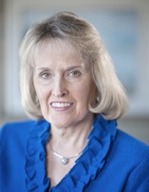
Lynn Haglin is the vice president and KIDS PLUS director for the Northland Foundation in Duluth. Her experience includes over 30 years in administration, community development, education, and philanthropy, with an extensive background in early childhood, youth development, and intergenerational programming. Haglin provides leadership for the foundation’s KIDS PLUS Program, which is dedicated to improving the well-being of children and youth from birth to adulthood. Under her guidance, the KIDS PLUS family of programs has developed a wide array of initiatives in response to regional needs; raised millions of dollars from local, state, and national funding partners; provided extensive technical assistance to develop 52 coalitions serving rural communities and Indian reservations; and received numerous state and national honors and distinctions for innovative work aimed at helping children, youth, older adults, and communities thrive. During the past 10 years, Haglin has provided leadership for the Minnesota Initiative Foundations’ Minnesota Early Childhood Initiative and the Minnesota Thrive Initiative.
Haglin has been involved in numerous boards and committees such as Ready 4-K: Youth Community Connections, Children, Youth and Family Consortium; BUILD Core Committee; and the Minnesota Department of Human Services Family, Friend, and Neighbor Advisory Committee. She is currently involved with the Start Early Funders Coalition, Parent Aware for School Readiness, Minnesota Department of Human Services Parent Aware Advisory Committee, and Minnesota Afterschool Network Strategic Leadership Team and Policy Committee.
Haglin holds a master of arts in educational leadership and administration from Western Michigan University and a bachelors of science in elementary education from Bemidji State University. Before joining the Northland Foundation in 1992, Haglin started her career as a kindergarten teacher and educator for the Early Childhood Family Education Program; she also taught at the college level. She and her husband, Reid, live in Superior, Wisconsin, and have two married sons, one soon-to-be married son, along with three granddaughters under the age of five.
CEED offers its congratulations and gratitude to Lynn Haglin for her dedication to early childhood education and the ways in which her work exemplifies the words of former Senator Paul Wellstone that inspired the award’s name:
I know what I believe: I believe that every infant that I hold in my hands–every one of them, it makes no difference if it’s a boy or a girl, rich or poor–that every child in Minnesota and our world can have the same chance to reach her full potential or his full potential. I call on all Minnesotans and all of Minnesota to light a candle and lead the way. We can lead the way in Minnesota, and we will lead the way.
–Paul Wellstone




